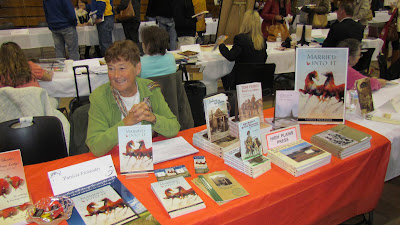 More good news to share…I’ve been invited to participate in the South
Dakota Festival of Books, October 7-9, 2011 in Deadwood, South Dakota, a 3-day
festival celebrating all things literary. This year’s theme is Native America, which
is why Hidden Heritage: The Story of Paul
LaRoche was selected as one of the books to have on hand.
More good news to share…I’ve been invited to participate in the South
Dakota Festival of Books, October 7-9, 2011 in Deadwood, South Dakota, a 3-day
festival celebrating all things literary. This year’s theme is Native America, which
is why Hidden Heritage: The Story of Paul
LaRoche was selected as one of the books to have on hand.
I'm scheduled for two presentations, Saturday, October 8th, at the Franklin Hotel, Main Street, Deadwood.
Saturday, 10 am: "Seeking Heritage: Where Literature and Identity Intersect", with Minnesota author Colleen Baldrica.
Saturday, 4 pm: "The Hidden Heritage Journey"
All authors are invited to take part in two book signings at the Deadwood Pavillion/Chamber of Commerce: Friday, October 7, 4-5 pm, and Saturday, October 8, 12:30-2 pm.
Attending the festival in Deadwood has deeper meaning for me, because
that is where the ‘Hidden Heritage Journey’ first began. Here's what I mean...
THE DEADWOOD CIRCLE
The
Hidden Heritage journey began with a chance encounter in the tourist town of
Deadwood, South Dakota. On a family vacation in the Black Hills in 1999 we
happened upon Brulé playing near the sidewalk seating of the Buffalo Stockade
bar on Main Street. The music from this small, upcoming band of three was as
captivating as the surrounding landscape. Their distinct sound initially caught
my attention—the hauntingly beautiful mix of flute, keyboard, and traditional
drum they are now famous for. Listening one could immediately sense something
deeper at the heart of it. Sure enough, in reading Paul’s Artist Bio I was
equally captivated by his life story.
All
the way back to Minneapolis I heard a voice, You should write a book about this man…
But
before I reached home my own doubts drowned out the voice, telling me I had no
connection to Paul LaRoche, a complete stranger. I wasn’t Native American or
adopted, and more importantly I didn’t have any writing credentials. The
loudest doubt pushed through time and time again: You’re not a real writer; you’ve never even been published! Yet
each time I listed to Paul’s unique music, the voice returned.
Three
years passed before I dispelled the doubts and found the courage to respond…and
as soon as I did, an amazing journey
began. First came an article about Paul, published in a regional magazine, followed by the book in 2006, Hidden Heritage: The Story of Paul LaRoche, including two awards. That summer I joined Paul for book
signings at several Brulé events, but none was more moving than at Mount Rushmore
National Monument. I stood on the park’s plaza, the majestic monument in the
backdrop, beautiful Brulé music playing in the mountain air, signing books
alongside Paul. It was a moment I never could have imagined seven years earlier
on our first vacation to the Black Hills.
Yes,
there have been roadblocks along the way, some bigger than others, but with
faith and perseverance we’ve tromped over and around those obstacles, committed to keep this journey on track. In 2009 Hidden Heritage, a documentary-style
television series premiered on the RFD-TV cable network, opening a door for Brulé
to perform at the RFD-TV Theater in Branson, a show that’s now described as 'a
Native American experience in sight, sound, and soul.' On January 1, 2011, Brulé
performed atop One Nation, a Native American-themed float in the prestigious Tournament of Roses Parade in Pasadena,
sponsored by RFD-TV.
So
next week I return to Deadwood to attend the South Dakota Festival of Books as
an invited author, 12 years after I first saw Paul playing his soul-stirring music.
Chance encounter? Hardly. Every phase of this journey declares it is God’s
perfectly designed plan, a journey that is far from complete.
While
writing Hidden Heritage, I discovered
Paul’s great-great-great grandfather, a Yankton chief named Strikes the Ree
(1804-1888), was an important figure in American history. In 1804 Lewis and
Clark camped at Calumet Bluff when word came that a baby had just been born. The
famed explorers wrapped the infant in a flag and declared that he would someday
be a great American citizen. Their prophecy indeed came true. Strikes the Ree
became a great leader among his people and played a significant role as a
peacemaker during the Great Sioux Uprising. During his life he traveled to
Washington DC and received peace medals from three US presidents. Worthy of an
epic tale, the great burdens the chief bore during the years of cession and
settlement on the Northern Plains have largely been overlooked by historians.
 |
Strikes the Ree
South Dakota State Historical Society Photo |
I
believe the Hidden Heritage journey
has led to this important, historical book. All this and more I could have
missed, had I not taken that first step.
Where is your journey taking you?
Barbara






















































